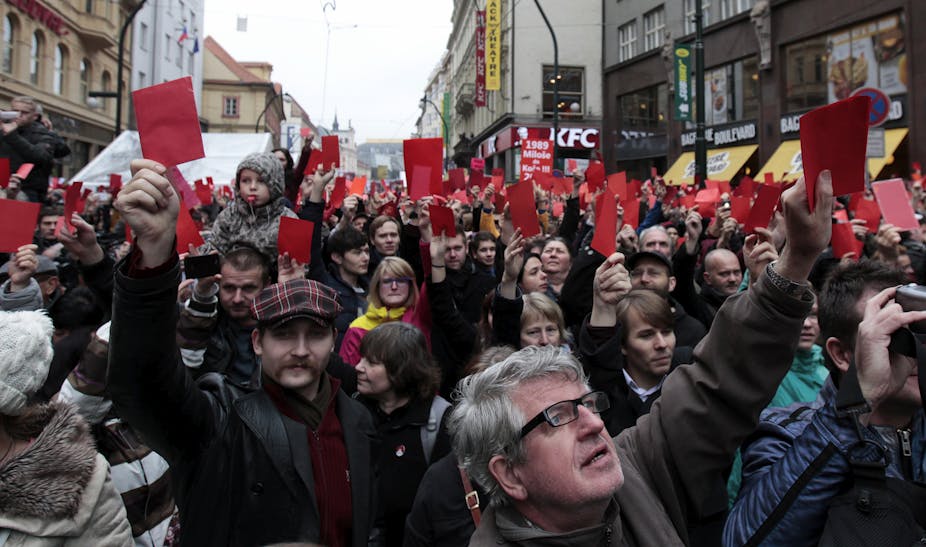The United States had just gone through a bruising election, but in Congress Democratic and Republican leaders gathered to unveil the bust of Vaclav Havel, the playwright and first post-Communist Czech president and only the fourth non-American to be installed in this hallowed space. John Boehner and Nancy Pelosi praised Havel as a champion of freedom and human rights who used truth to defeat his totalitarian opponents.
Meanwhile in Prague, the city where Havel staged the Velvet Revolution twenty-five years ago, the streets were filled with demonstrators who thundered at Milos Zeman, the current president: “Resign! Resign!” and waved red cards, the kind used in soccer to eject a player who committed an egregious foul. Opinion polls show that the demonstrators represent two thirds of their fellow citizens who find Zeman to be a failure on the international scene and a divisive force at home.
How did it happen that the Czech Republic’s presidency declined from the universally respected Havel to the present low? For an answer we have to look at today’s Russia and the crisis in Ukraine.
The new Prague-Moscow axis
When Putin annexed Crimea and sent weapons and military personnel into eastern Ukraine, the United States and the European Union responded with sanctions. The shooting down of the Malaysian airliner MH17 hardened the Western response and caused some to speculate about a new cold war.
Inexplicably, President Zeman called on his EU and NATO partners to accept Russia’s annexation of Crimea on the grounds that the 1954 decree that transferred the region to Ukraine was “stupid.” He went on Russian television and denounced the sanctions as counterproductive. As far as the fighting in eastern Ukraine was concerned, Zeman argued, the West had no right to interfere since it was a civil war.

But what about the weapons and troops dispatched by Putin, he was asked by then Swedish Foreign Minister Carl Bildt . None of that was true, he replied. He believed Foreign Minister Sergei Lavrov who stated that not a single Russian soldier had entered Ukraine.
Zeman’s apparent willingness to believe Moscow is difficult to comprehend: anyone familiar with Czech history in the 1930s cannot fail to see the parallels between Putin’s takeover of Crimea and the Nazi Anschluß of Austria in 1938. Hitler argued that it was only an administrative measure that corrected a historical fluke, and since all involved spoke German, it was a “family affair” that was of no concern to outsiders. Sound familiar?
Equally strong similarities can be seen between today’s eastern Ukraine and the 1938 Czechoslovak-German crisis in the Sudetenland. Regarding the latter, Hitler insisted that the Czechs “terrorized” the German-speaking Sudetens living in Czechoslovakia and he needed to protect them by seizing the territory.
Controversial conference
Then President Zeman took a further step that created a gap between the Czech Republic and its EU and NATO partners. In September he attended a conference organized by Vladimir Yakunin, a billionaire who heads the Russian Railways and is also widely believed to have been a KGB operative. Yakunin heads a movement called National Glory of Russia that aims to protect the country from the corrosive Western culture. This does not, by the way, prevent Yakunin and his family from owning a house in London worth millions of dollars. As one cyberwag put it: he hates everything Western, except money.
Zeman used this questionable forum to demand an end to Western sanctions and to assert that the Ukrainian crisis was merely “a flu.”
When he encountered criticism at home and abroad for such pro-Kremlin statements, Zeman was nonplussed. He dismissed Havel’s accent on human rights in foreign affairs as naïve and declared during an official visit to China that he came to learn how to “stabilize society.” As if en passant Zeman added that Taiwan and Tibet were inalienable parts of China. Havel, by contrast, was on friendly terms with the Dalai Lama and a champion of Free Tibet.
Expletives on the radio and dissing American beer
Apparently invigorated by further negative comments, Zeman stated in a live interview on Czech Radio filled with profanities that the imprisoned members of the anti-Putin Pussy Riot group were “whores” who richly deserved their sojourns to the Gulag. Regarding Russian oligarch and Putin opponent Mikhail Khodorkovsky, Zeman opined that if he disapproved of something Putin had done, it was that he had failed to dispatch all the oligarchs to prison.
For his latest performance at the end of November, Zeman chose Kazakhstan, where he promoted Czech beer by dismissing its American competitor as “dirty water.” He then expressed his “unalterable view” that Ukraine should be “neutralized and Finlandized” under the tutelage of Russia, and never admitted into NATO.
Before he became president, Zeman - an economist by training who joined the Social Democratic Party after 1989, became prime minister in 1998 but then left politics for 12 years – held mainstream foreign policy views. What has happened, and why so suddenly? Why does he now have to be reminded by his own foreign minister that all decisions regarding the future of Ukraine belong to its citizens?

As happens often when confronted with mysteries, some have resorted to conspiracy theories. But the principle of Occam’s Razor teaches that the simplest explanations tend to be correct. Here is mine.
When he compares himself to Vaclav Havel, Milos Zeman sees his own smallness. This propels him toward attention-seeking pronouncements and other forms of political exhibitionism.
It seems incredible that the unity of the West, and the legacy of the Velvet Revolution, should be jeopardized by a man struggling with his own insignificance.

